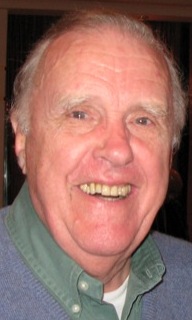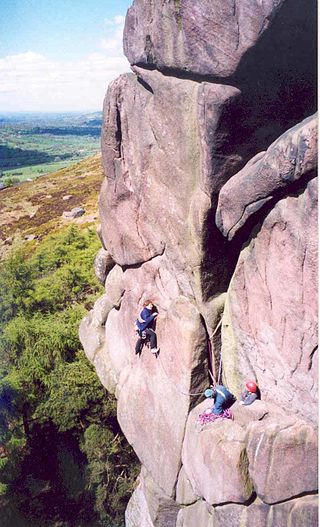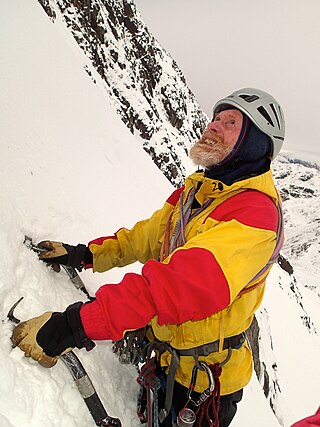
Mountaineering, mountain climbing, or alpinism is a set of outdoor activities that involves ascending mountains. Mountaineering-related activities include traditional outdoor climbing, skiing, and traversing via ferratas that have become sports in their own right. Indoor climbing, sport climbing, and bouldering are also considered variants of mountaineering by some, but are part of a wide group of mountain sports.

Scrambling is a mountaineering term for ascending steep terrain using one's hands to assist in holds and balance. It is also used to describe terrain that falls between hiking and rock climbing.

The International Climbing and Mountaineering Federation, commonly known by its French name Union internationale des associations d'alpinisme, was founded in August 1932 in Chamonix, France when 20 mountaineering associations met for an alpine congress. Count Charles Egmond d'Arcis, from Switzerland, was chosen as the first president and it was decided by the founding members that the UIAA would be an international federation which would be in charge of the "study and solution of all problems regarding mountaineering". The UIAA Safety Label was created in 1960 and was internationally approved in 1965 and currently (2015) has a global presence on five continents with 86 member associations in 62 countries representing over 3 million people.
Plas y Brenin, located in Conwy County Borough, Wales, is a National Outdoor Centre owned by Sport England. The centre is situated in Dyffryn Mymbyr, the Mymbyr Valley, in Snowdonia and is less than a quarter of a mile south-west of the centre of Capel Curig on the A4086 road.
Established in 1889, the Scottish Mountaineering Club is a club for climbing and mountaineering in Scotland.

Douglas Keith Scott was an English mountaineer, noted for being on the team that made the first ascent of the south-west face of Mount Everest on 24 September 1975. In receiving one of mountaineering's highest honours, the Piolet d'Or Lifetime Achievement Award, his personal style and climbs were described as "visionary".
Mountaineering Scotland is the national representative body and membership organisation for mountaineers, hillwalkers, climbers and ski tourers who live in Scotland or enjoy Scotland's mountains. With nearly 16,000 members as of 2022, it encourages participation and progression in these activities, promotes safety and skills, campaigns to safeguard access rights and responsibilities, and seeks to protect Scotland's cherished mountain landscapes from insensitive development. The organisation is based in Perth and was formerly known as the Mountaineering Council of Scotland (MCofS).

Donald Desbrow Whillans was an English rock climber and mountaineer. He climbed with Joe Brown and Chris Bonington on many new routes, and was considered the technical equal of both.
The American Alpine Club (AAC) is a non-profit member organization with more than 24,000 members. Its vision is to create "a united community of competent climbers and healthy climbing landscapes." The club is housed in the American Mountaineering Center (AMC) in Golden, Colorado.

John Angelo Jackson was an English mountaineer, explorer and educationalist.

Ian McNaught-Davis was a British television presenter best known for presenting the BBC television series The Computer Programme, Making the Most of the Micro and Micro Live in the 1980s. He was also a mountaineer and alpinist. He was managing director of the British subsidiary of Comshare Inc.

The Climbers' Club is the senior rock-climbing club in England and Wales. The club was founded in 1898. The CC one of the largest publishers of climbing guidebooks in many of the main climbing areas of England and Wales. The club also owns and operates a number of climbing huts in England, Scotland, and Wales.
The Rucksack Club was founded in Manchester in 1902 and has a current membership of well over 500 men and women. According to the Rules, "The purpose of the Club is to encourage mountaineering, climbing and hill walking and bring together all those who are interested in these pursuits."
Gwen Mary Moffat is a British mountaineer and writer.
Alan Blackshaw OBE was an English mountaineer, skier and civil servant who was President of the Alpine Club from 2001 to 2004 and President of the Ski Club of Great Britain from 1997 to 2003.

Climbing, or alpine, clubs form to promote and preserve the climbing way of life, including rock climbing, ice climbing, alpinism & ski mountaineering.
The Lairig Club, commonly referred to as "The Lairig" is the University of Aberdeen’s Mountaineering Club and was founded in the early 1940s. Members take part in a wide range of activities from hillwalking and sport climbing right through to winter climbing, Ski touring and alpinism. Due to the university calendar and its close proximity to reliable venues winter mountaineering is the main focus of the club along with hillwalking. Over the winter season the club prides itself as being one of the most active university mountaineering clubs in the UK and works with the mission statement: "To give the opportunity to participate in, and develop the skills for, safe mountaineering in all conditions." The club has a long and distinguished history painted by famous names such as Tom Patey and Andy Nisbet, two of Scotland's most prolific new routers, who learnt their trade in the Lairig.

Andrew Nisbet was a Scottish mountaineer, guide, climbing instructor, and editor of climbing guidebooks. Regarded as a pioneer of mixed rock and ice climbing techniques, he built a 45-year reputation as an innovator by developing over 1,000 new winter climbing routes in Scotland, of which 150 were at Grade V, or above.
Mountaineering Ireland is the representative association for hikers and mountaineers on the island of Ireland. It is recognized by both Sport Ireland, the Irish authority for sport, and Sport Northern Ireland, the corresponding authority of the Government of Northern Ireland, thus operating across the island of Ireland. The association has been an International Climbing and Mountaineering Federation (UIAA) member since 2004, as well as a member of other federations. The association is also a publisher of walking and climbing guides.
Paul James Nunn was an Irish-born mountaineer, and an author and economic historian.










